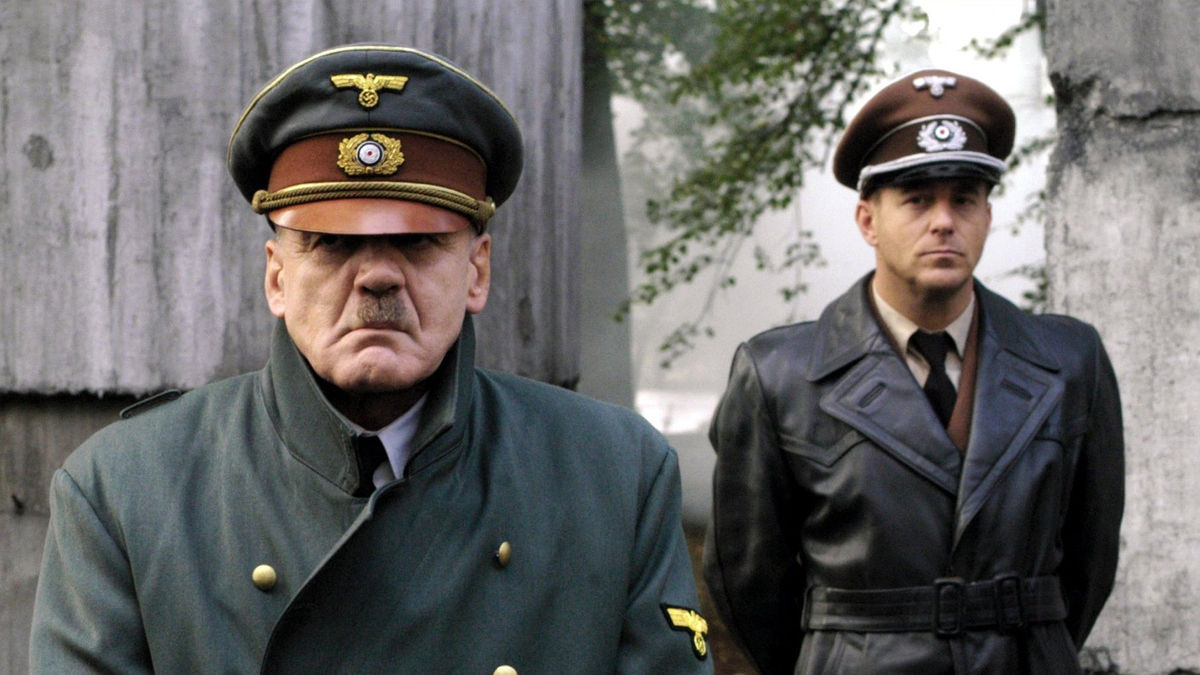
The movie “Downfall” is a gripping and intense portrayal of the final days of Adolf Hitler’s reign during World War II. Released in 2004, the film offers viewers a glimpse into the inner workings of the Nazi regime and the personal struggles of those who were part of it.
Directed by Oliver Hirschbiegel and starring Bruno Ganz as Adolf Hitler, “Downfall” presents a unique perspective on the events leading up to the fall of Berlin and the ultimate defeat of the Nazi regime. It delves into the psychological complexities of Hitler and his close associates, shedding light on the power dynamics and internal conflicts.
In this article, we will explore 46 fascinating facts about the movie “Downfall,” from its production and cast to its critical reception and impact on popular culture. So, buckle up and prepare to dive into the intriguing world of this iconic film!
Key Takeaways:
- “Downfall” is a gripping German film about Hitler’s final days, featuring powerful performances and historical accuracy, sparking renewed interest in World War II history and leaving a lasting impact on cinema.
- The movie’s intense portrayal of Hitler’s bunker, the psychological state of his inner circle, and the Battle of Berlin, along with its meticulous production, has made it a valuable case study in film schools and an important part of German cinema history.
Downfall is a German historical war drama film.
Set during the final days of Adolf Hitler’s rule over Nazi Germany, the film provides a chilling portrayal of the downfall of the Third Reich.
The movie was released in 2004.
Directed by Oliver Hirschbiegel, Downfall received critical acclaim for its gripping narrative and outstanding performances.
It is based on the book “Inside Hitler’s Bunker” by Joachim Fest.
The film captures the events leading up to Hitler’s suicide in his bunker in Berlin, as described in Fest’s meticulously researched account.
Bruno Ganz delivers an unforgettable performance as Adolf Hitler.
Ganz’s portrayal of Hitler garnered widespread praise for its depth and authenticity.
Downfall was nominated for an Academy Award for Best Foreign Language Film.
The film’s powerful storytelling and gripping performances earned it international recognition.
The movie spans a duration of approximately 2 hours and 36 minutes.
During this time, audiences are immersed in the intense and dramatic events taking place in Hitler’s bunker.
Many of the film’s scenes were shot on location in Germany.
This adds an extra layer of authenticity to the movie, as the actual places associated with Hitler’s final days were used as backdrops.
Downfall explores the psychological state of those inside the bunker.
The film delves deep into the minds of Hitler and his inner circle, portraying their desperation and denial in the face of impending defeat.
The movie has a gripping and realistic depiction of the Battle of Berlin.
This intense battle provides a backdrop for the events unfolding in the bunker, highlighting the chaos and destruction of the last days of World War II.
Downfall has been credited with igniting a renewed interest in the history of World War II.
The film’s impact on popular culture sparked a surge of curiosity and exploration of the events surrounding Hitler’s final days.
The powerful performances in Downfall received widespread acclaim.
From Bruno Ganz’s haunting portrayal of Hitler to the supporting cast, the actors brought depth and empathy to their roles.
The movie’s screenplay was written by Bernd Eichinger.
Eichinger’s script expertly captures the tension and despair prevalent in the bunker, providing viewers with a profound cinematic experience.
Downfall sparked controversy upon its release.
The film was criticized for humanizing Hitler and his associates, but it also opened up meaningful discussions about the nature of evil and the psychology of power.
The film’s soundtrack perfectly complements the tone and atmosphere.
The haunting and evocative music heightens the emotional impact of the story, adding depth to the already powerful visuals.
Downfall has inspired numerous parodies and internet memes.
The iconic scene where Hitler rants in the bunker has been dubbed over with humorous subtitles, creating a viral internet phenomenon.
Bruno Ganz underwent extensive research and preparation for his role.
He studied hours of archival footage and books to truly understand the mannerisms and speech patterns of the infamous dictator.
The movie received widespread international distribution.
It was screened in numerous countries, allowing audiences worldwide to witness this harrowing depiction of history.
Downfall was a commercial success.
Despite its intense subject matter, the film attracted a wide audience and achieved significant box office success.
It has an impressive rating on review aggregator websites.
The film has garnered positive reviews, with critics praising its authenticity, performances, and historical accuracy.
Downfall’s impact on German cinema cannot be overstated.
The movie marked a significant turning point in German filmmaking, solidifying its industry’s global presence.
The film’s production design and costume design were meticulous.
Every detail was taken into account to recreate the look and feel of Hitler’s bunker and the characters’ period attire.
Downfall received a nomination for the Palme d’Or at the 2004 Cannes Film Festival.
This prestigious nomination further solidified the film’s reputation as a masterpiece of cinema.
The movie’s success led to various international remakes.
Many countries sought to recreate the intense atmosphere of Downfall, resulting in their own adaptations of Hitler’s final days.
Downfall continues to be studied and analyzed in film schools.
Its storytelling techniques, performances, and historical significance make it a valuable case study for aspiring filmmakers.
The film portrays Hitler in his final days, showcasing his deteriorating mental and physical state.
Through Ganz’s spellbinding performance, viewers witness the decline of a man consumed by delusion and despair.
Downfall uses a multi-perspective narrative approach.
The film shifts focus between various characters, providing unique insights into their experiences and perceptions.
The portrayal of Hitler’s secretary, Traudl Junge, adds a human element to the story.
Junge’s character serves as the audience’s entry point into the chaotic and disturbing world inside the bunker.
Downfall has been lauded for its accurate portrayal of historical events.
The filmmakers took great care to recreate the details of Hitler’s final days, staying true to the recorded accounts.
The movie’s production was not without challenges.
From finding the right actors to recreating the historical settings, the filmmakers faced numerous obstacles in bringing the story to life.
Downfall is known for its powerful and emotionally charged scenes.
From Hitler’s breakdown to the final moments of desperation, the film delivers unforgettable moments that resonate with viewers.
The movie’s cinematography captures the claustrophobic nature of the bunker.
The close-ups and dim lighting contribute to the overwhelming sense of confinement and impending doom.
Downfall explores the moral complexities of those involved in Hitler’s regime.
It raises questions about individual responsibility and the choices made in the face of tyranny and oppression.
The film received the German Film Award for Best Direction.
Hirschbiegel’s masterful direction brought the story to life with gripping intensity and emotional depth.
Downfall has become a staple in history classrooms.
Teachers often use the film as a visual aid to enhance students’ understanding of the events surrounding Hitler’s downfall.
The movie’s screenplay includes moments of dark humor.
These moments provide brief respite from the heavy subject matter and offer a glimpse into the characters’ coping mechanisms.
Downfall allows viewers to witness the inner workings of Hitler’s inner circle.
From Hermann Göring to Joseph Goebbels, the film provides a chilling portrait of the leaders who supported and followed Hitler until the bitter end.
The set design of Hitler’s bunker is incredibly detailed.
Every room and corridor is meticulously recreated, creating an immersive experience for viewers.
Downfall has been praised for its realistic depiction of violence.
The film does not shy away from showing the brutality and devastation of war, contributing to its authenticity.
The movie’s release sparked a resurgence in interest in historical films in Germany.
It prompted filmmakers to explore other untold stories from World War II and beyond.
Downfall’s impact can be felt beyond the realm of cinema.
Its depiction of Hitler’s downfall and the consequences of his actions serves as a cautionary tale for future generations.
The film features a diverse cast of characters.
From military leaders to civilians, Downfall provides a multifaceted portrayal of the people affected by Hitler’s reign.
The movie’s marketing campaign created anticipation and curiosity.
Trailers and promotional materials hinted at the intensity and historical significance of the film, generating buzz among audiences.
Downfall earned numerous accolades and nominations.
Its exceptional storytelling and powerful performances garnered recognition from prestigious award ceremonies around the world.
The film’s foreign-language status did not hinder its success.
Downfall reached a global audience, transcending language barriers and making a powerful impact on viewers of various nationalities.
Downfall remains an important part of German cinema history.
The film’s contributions to the industry’s growth and international recognition cannot be overstated.
The legacy of Downfall lives on through its lasting impact on cinema and historical storytelling.
Its poignant portrayal of Hitler’s final days continues to captivate audiences and ignite discussions about the horrors of war and the consequences of unchecked power.
Conclusion
In conclusion, “Downfall” is a remarkable film that provides a riveting portrayal of the final days of Adolf Hitler and the fall of Nazi Germany. With its powerful performances, meticulous attention to historical detail, and gripping narrative, the movie takes viewers on an emotional and thought-provoking journey. Whether you are a history enthusiast or a film lover, “Downfall” is a must-watch for its raw portrayal of human nature in extreme circumstances and its exploration of the consequences of power and ideology.The film continues to captivate audiences worldwide, sparking discussions about the complexities of World War II and its aftermath. Its impact on cinema is undeniable, leaving a lasting legacy as one of the most significant historical dramas ever made. From the exceptional direction of Oliver Hirschbiegel to Bruno Ganz’s unforgettable portrayal of Adolf Hitler, “Downfall” stands as a cinematic masterpiece that will continue to mesmerize audiences for generations to come.
FAQs
Q: Is “Downfall” a true story?
A: Yes, “Downfall” is based on historical events and offers a dramatized account of the final days of Adolf Hitler and the collapse of Nazi Germany.
Q: Are the actors speaking in their native languages in “Downfall”?
A: Yes, the film uses a multilingual approach, with the characters speaking in their respective native languages. This adds to the authenticity and realism of the portrayal.
Q: What kind of impact did “Downfall” have on cinema?
A: “Downfall” had a significant impact on cinema, both critically and commercially. It received widespread acclaim for its performances, storytelling, and historical accuracy, while also achieving notable success at the box office.
Q: Can you recommend other movies similar to “Downfall”?
A: If you enjoyed “Downfall,” you might also be interested in films like “Schindler’s List,” “The Pianist,” and “The Boy in the Striped Pyjamas,” which explore different aspects of World War II and its human impact.
Q: Is “Downfall” appropriate for all audiences?
A: “Downfall” is a historical drama that deals with mature themes and contains scenes of violence. It is recommended for mature audiences who can fully grasp the historical context and handle the intense subject matter.
If you're fascinated by the gripping portrayal of history in Downfall, don't miss our captivating articles on World War II facts, the enigmatic figure of Adolf Hitler, and the biographical film The Life and Death of Peter Sellers. Immerse yourself in the depths of historical events, uncover the secrets of notorious leaders, and explore the world of cinematic storytelling. Each article promises to engage, inform, and leave you craving more. Click now to embark on a journey through time and witness history come alive through the power of words and the magic of the silver screen!
Was this page helpful?
Our commitment to delivering trustworthy and engaging content is at the heart of what we do. Each fact on our site is contributed by real users like you, bringing a wealth of diverse insights and information. To ensure the highest standards of accuracy and reliability, our dedicated editors meticulously review each submission. This process guarantees that the facts we share are not only fascinating but also credible. Trust in our commitment to quality and authenticity as you explore and learn with us.


